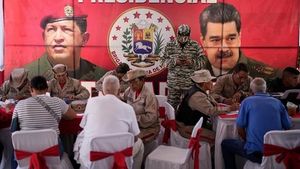Speculation about the potential for World War III has intensified recently, with various political figures and analysts drawing alarming conclusions about the state of global affairs. The discourse has converged around key factors such as the conflict between Ukraine and Russia, nuclear threats, and geopolitical maneuvers involving major world powers like the United States and China.
One of the latest voices to weigh in on the global tensions is President-elect Donald Trump, who asserted on multiple occasions, "We have never been closer to World War III than we are today." Trump emphasized the urgency of pursuing peace, particularly concerning the Ukraine conflict. He believes all hostilities must cease and has called for direct negotiations between Ukrainian President Volodymyr Zelenskyy and Russian President Vladimir Putin. Trump's argument hinges on the idea of minimizing the risk of global conflict, stating, "Every day this proxy battle continues, we risk global war" and insisting, "Nothing is more important than avoiding this nightmare."
Trump’s perspective echoes the sentiments of those who warn of the dire consequences of prolonged military engagements. He lambasted the current administration, accusing it of failing to control domestic issues and presenting foreign wars as distractions from pressing national concerns like crime and immigration. He posited, "We need leadership to put our country first, not drag us to conflicts..." This stance is emblematic of his broader critique of the political establishment, which he claims fosters endless wars under the facade of promoting democracy abroad.
On the other hand, former German Chancellor Angela Merkel has also expressed her grave concerns. She warned against the nuclear escalation risks exacerbated by the Ukraine conflict, providing yet another layer of urgency to the discussion around possible global discord. Merkel indicated the grave risks of miscalculations leading to catastrophic consequences, emphasizing, "The situation can spiral out of control..."
Analyzing these viewpoints, Timothy Snyder, a historian and scholar of international relations, argued vehemently against the notion of World War III being imminent. He described how Ukraine's resistance to the Russian invasion fundamentally alters the traditional scenarios for conflict. Snyder noted, "Ukrainians are the firemen keeping the rest of us safe" and stressed their role as deterrents against wider escalation. He explained, "Thanks to Ukraine, the war has been contained to their territory," which prevents it from spreading across Europe.
Snyder presented three scenarios for the emergence of World War III: escalation from conventional wars, the Pacific conflict involving China, and nuclear proliferation. He argued for active support for Ukraine as the best method to mitigate these scenarios. He stated, "A Ukrainian victory is the best way to prevent war in Asia," highlighting the interconnectedness of global conflicts today. If Ukraine were to face defeat without sufficient support, the Ukrainian resistance could crumble, potentially opening gateways for conflict to erupt elsewhere.
Recent weeks have emphasized the fragility of the situation. Following Hamas's attack on Israel on October 7, 2023, many believe this event marks the beginning of another phase of the unacknowledged World War III—one characterized by clashes across various fronts, including heightened tensions involving Iran and its global allies. Çiğdem Doğu, from the Community of Kurdistan Women, elaborated on this idea, noting, "World War III is being fought without naming it and without making it visible. It has been directed against societies, women and nature for almost 30 years." She warns of the danger of underestimations of these conflicts and their impact on broader society.
On the brink of this potential catastrophe, many feel compelled to address not only tactical military responses but also the underlying societal dilemmas. Snyder stressed the importance of clarity, stating, "It cannot be ended by fake masculinity or real hysteria..." This highlights the need for rational approaches rather than succumbing to panic-driven narratives about the war. The impact of media, public perception, and strategic communications significantly influences how these conflicts are understood and awaited.
Yet amid these complex discussions, many are echoing Trump's insistence on diplomacy. The nature of negotiations with Russia remains uncertain, as many analysts caution against believing Vladimir Putin's assertions during discussions. Trump’s advisors suggest his administration will focus on preventing escalation, and highlight military support for Ukraine as crux to maintain stability.
The international community’s responses are similarly multifaceted. U.S. foreign policy has increasingly come under scrutiny. Analysts argue for continuous support for Ukraine, warning of the severe repercussions of withdrawing military assistance. There is also speculation around China's growing influence, with many officials recognizing the significance of maintaining pressure on both Russia and China simultaneously.
Yet, divergent perspectives remain, with some advisors advocating for potential peace negotiations with Russia; others position such actions as naive, asserting any concessions would be seen as weakness. Senator Marco Rubio and others propose maintaining pressure until the Kremlin wholly withdraws, emphasizing the necessity of not allowing Russia any semblance of victory. This viewpoint encapsulates the broader debate of the West's role concerning both Russia and China.
On the economic front, the challenges become evident with compounding issues affecting Russia and China’s economies. Facing its own economic challenges, Russia's economy is floundering, being heavily impacted by sanctions resulting from its invasion of Ukraine and military expenditures. This situation has led to visible public distress, manifested through protests and dissatisfaction with the current regime.
Recent reports indicate vulnerabilities within China as well, prompting fears related to economic stability, which plays directly to international tensions with Beijing's ambitions within the Indo-Pacific. Political analysts maintain the need to remain vigilant against both nuclear proliferation and warfare outbreaks arising from these burgeoning tensions among multiple world powers.
Despite the fears and uncertainties contributing to the speculation on World War III, calls for resolute leadership, strategic clarity, and diplomatic engagement persist as themes among both political leaders and analysts. What remains to be seen is how these complex geopolitical landscapes will play out and whether global powers can navigate toward peace or if they will find themselves irrevocably drawn toward conflict.
Current discourses around the specter of World War III echo sentiments of urgency, reflecting the intertwined nature of political, economic, and military actions today. Amidst all these tales of potential cataclysm, skepticism also lingers—sparking discussions on how best to tackle these challenges to prevent the scenario of global confrontation.



